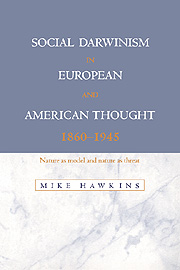Book contents
- Frontmatter
- Contents
- Acknowledgements
- Part I Defining Social Darwinism
- Part II Pioneers
- Part III Case studies
- 7 Reform Darwinism
- 8 Races, nations and the struggle for existence
- 9 The eugenic conscience
- 10 Social Darwinism, nature and sexual difference
- 11 Nazism, Fascism and Social Darwinism
- Postscript: Social Darwinism old and new: the case of sociobiology
- Bibliography
- Index
7 - Reform Darwinism
Published online by Cambridge University Press: 07 December 2009
- Frontmatter
- Contents
- Acknowledgements
- Part I Defining Social Darwinism
- Part II Pioneers
- Part III Case studies
- 7 Reform Darwinism
- 8 Races, nations and the struggle for existence
- 9 The eugenic conscience
- 10 Social Darwinism, nature and sexual difference
- 11 Nazism, Fascism and Social Darwinism
- Postscript: Social Darwinism old and new: the case of sociobiology
- Bibliography
- Index
Summary
Introduction
There is a sense in which many of the theorists discussed thus far could be regarded as ‘reform Darwinists’. A. R. Wallace was a socialist; Lombroso, Brace, Haeckel, Royer and Büchner advocated considerable social and political change; and even Spencer and Sumner could be highly critical of contemporary values and institutions. With the extension of democracy during the nineteenth and early twentieth centuries, though, there came an intensification of debates over universal suffrage, equality, the emancipation of women, welfare provision and international fraternity. Darwinism was enlisted by protagonists on all sides of these debates: the concern of this chapter is with theorists supportive of socio-political change in the direction of greater equality, public welfare, and democracy. They ranged from Marxist revolutionaries through to democratic socialists and ‘New Liberals’ – all sharing a commitment to the use of state power in order to achieve their goals – but also included anarchists desirous of radical change but opposed to the state in any form.
The purpose of this examination is two-fold. The first is to argue that although there was a genre of reformist and socialist Darwinism, some of what has been subsumed under this label was actually opposed to Darwinism as defined in this study. The second aim is to explore the discursive limits of the world view. No matter how polysemous the elements of Social Darwinism were, their integration into a systematic whole acted as a constraint upon their appropriation by any and every ideological and theoretical enterprise. We have already encountered examples of how such constraints generated tensions within theories which presented peaceful cooperation as an ultimate social objective.
- Type
- Chapter
- Information
- Social Darwinism in European and American Thought, 1860–1945Nature as Model and Nature as Threat, pp. 151 - 183Publisher: Cambridge University PressPrint publication year: 1997



